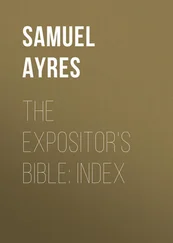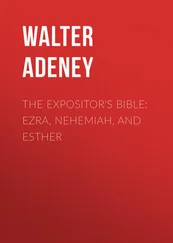Robert Alexander Watson - The Expositor's Bible - Judges and Ruth
Здесь есть возможность читать онлайн «Robert Alexander Watson - The Expositor's Bible - Judges and Ruth» — ознакомительный отрывок электронной книги совершенно бесплатно, а после прочтения отрывка купить полную версию. В некоторых случаях можно слушать аудио, скачать через торрент в формате fb2 и присутствует краткое содержание. Издательство: Иностранный паблик, Жанр: foreign_prose, foreign_religion, Философия, foreign_psychology, foreign_antique, на английском языке. Описание произведения, (предисловие) а так же отзывы посетителей доступны на портале библиотеки ЛибКат.
- Название:The Expositor's Bible: Judges and Ruth
- Автор:
- Издательство:Иностранный паблик
- Жанр:
- Год:неизвестен
- ISBN:нет данных
- Рейтинг книги:5 / 5. Голосов: 1
-
Избранное:Добавить в избранное
- Отзывы:
-
Ваша оценка:
- 100
- 1
- 2
- 3
- 4
- 5
The Expositor's Bible: Judges and Ruth: краткое содержание, описание и аннотация
Предлагаем к чтению аннотацию, описание, краткое содержание или предисловие (зависит от того, что написал сам автор книги «The Expositor's Bible: Judges and Ruth»). Если вы не нашли необходимую информацию о книге — напишите в комментариях, мы постараемся отыскать её.
The Expositor's Bible: Judges and Ruth — читать онлайн ознакомительный отрывок
Ниже представлен текст книги, разбитый по страницам. Система сохранения места последней прочитанной страницы, позволяет с удобством читать онлайн бесплатно книгу «The Expositor's Bible: Judges and Ruth», без необходимости каждый раз заново искать на чём Вы остановились. Поставьте закладку, и сможете в любой момент перейти на страницу, на которой закончили чтение.
Интервал:
Закладка:
VII.
THE SIBYL OF MOUNT EPHRAIM
There arises now in Israel a prophetess, one of those rare women whose souls burn with enthusiasm and holy purpose when the hearts of men are abject and despondent; and to Deborah it is given to make a nation hear her call. Of prophetesses the world has seen but few; generally the woman has her work of teaching and administering justice in the name of God within a domestic circle and finds all her energy needed there. But queens have reigned with firm nerve and clear sagacity in many a land, and now and again a woman's voice has struck the deep note which has roused a nation to its duty. Such in the old Hebrew days was Deborah, wife of Lappidoth.
It was a time of miserable thraldom in Israel when she became aware of her destiny and began the sacred enterprise of her life. From Hazor in the north near the waters of Merom Israel was ruled by Jabin, king of the Canaanites—not the first of the name, for Joshua had before defeated one Jabin king of Hazor, and slain him. During the peace that followed Ehud's triumph over Moab the Hebrews, busy with worldly affairs, failed to estimate a danger which year by year became more definite and pressing—the rise of the ancient strongholds of Canaan and their chiefs to new activity and power. Little by little the cities Joshua destroyed were rebuilt, re-fortified and made centres of warlike preparation. The old inhabitants of the land recovered spirit, while Israel lapsed into foolish confidence. At Harosheth of the Gentiles, under the shadow of Carmel, near the mouth of the Kishon, armourers were busy forging weapons and building chariots of iron. The Hebrews did not know what was going on, or missed the purpose that should have thrust itself on their notice. Then came the sudden rush of the chariots and the onset of the Canaanite troops, fierce, irresistible. Israel was subdued and bowed to a yoke all the more galling that it was a people they had conquered and perhaps despised that now rode over them. In the north at least the Hebrews were kept in servitude for twenty years, suffered to remain in the land but compelled to pay heavy tribute, many of them, it is likely, enslaved or allowed but a nominal independence. Deborah's song vividly describes the condition of things in her country. Shamgar had made a clearance on the Philistine border and kept his footing as a leader, but elsewhere the land was so swept by Canaanite spoilers that the highways were unused and Hebrew travellers kept to the tortuous and difficult by-paths down in the glens or among the mountains. There was war in all the gates, but in Israelite dwellings neither shield nor spear. Defenceless and crushed the people lay crying to gods that could not save, turning ever to new gods in strange despair, the national state far worse than when Cushan's army held the land or when Eglon ruled from the City of Palm Trees.
Born before this time of oppression Deborah spent her childhood and youth in some village of Issachar, her home a rude hut covered with brushwood and clay, like those which are still seen by travellers. Her parents, we must believe, had more religious feeling than was common among Hebrews of the time. They would speak to her of the name and law of Jehovah, and she, we doubt not, loved to hear. But with the exception of brief oral traditions fitfully repeated and an example of reverence for sacred times and duties, a mere girl would have no advantages. Even if her father was chief of a village her lot would be hard and monotonous, as she aided in the work of the household and went morning and evening to fetch water from the spring or tended a few sheep on the hill-side. While she was yet young the Canaanite oppression began, and she with others felt the tyranny and the shame. The soldiers of Jabin came and lived at free quarters among the villagers, wasting their property. The crops were perhaps assessed, as they are at the present day in Syria, before they were reaped, and sometimes half or even more would be swept away by the remorseless collector of tribute. The people turned thriftless and sullen. They had nothing to gain by exerting themselves when the soldiers and the tax-gatherer were ready to exact so much the more, leaving them still in poverty. Now and again there might be a riot. Maddened by insults and extortion the men of the village would make a stand. But without weapons, without a leader, what could they effect? The Canaanite troops were upon them; some were killed, others carried away, and things became worse than before.
There was not much prospect at such a time for a Hebrew maiden whose lot it seemed to be, while yet scarcely out of her childhood, to be married like the rest and sink into a household drudge, toiling for a husband who in his turn laboured for the oppressor. But there was a way then, as there is always a way for the high-spirited to save life from bareness and desolation; and Deborah found her path. Her soul went forth to her people, and their sad state moved her to something more than a woman's grief and rebellion. As years went by the traditions of the past revealed their meaning to her, deeper and larger thoughts came, a beginning of hope for the tribes so downcast and weary. Once they had swept victoriously through the land and smitten that very fortress which again overshadowed all the north. It was in the name of Jehovah and by His help that Israel then triumphed. Clearly the need was for a new covenant with Him; the people must repent and return to the Lord. Did Deborah put this before her parents, her husband? Doubtless they agreed with her, but could see no way of action, no opportunity for such as they. As she spoke more and more eagerly, as she ventured to urge the men of her village to bestir themselves, perhaps a few were moved, but the rest heard carelessly or derided her. We can imagine Deborah in that time of trial growing up into tall and striking womanhood, watching with indignation many a scene in which her people showed a craven fear or joined slavishly in heathen revels. As she spoke and saw her words burn the hearts of some to whom they were spoken, the sense of power and duty came. In vain she looked for a prophet, a leader, a man of Jehovah to rekindle a flame in the nation's heart. A flame! It was in her own soul, she might wake it in other souls; Jehovah helping her she would.
But when in her native tribe the brave woman began to urge with prophetic eloquence the return to God and to preach a holy war her time of peril came. Issachar lay completely under the survey of Jabin's officers, overawed by his chariots. And one who would deliver a servile people had need to fear treachery. Issachar was "a strong ass couching down between the sheepfolds"; he had "bowed his shoulder to bear" and become "a servant under task-work." As her purpose matured she had to seek a place of safety and influence, and passing southward she found it in some retired spot among the hills between Bethel and Ramah, some nook of that valley which, beginning near Ai, curves eastward and narrows at Geba to a rocky gorge with precipices eight hundred feet high,—the Valley of Achor, of which Hosea long afterwards said that it should be a door of hope. Here, under a palm tree, the landmark of her tent, she began to prophesy and judge and grow to spiritual power among the tribes. It was a new thing in Israel for a woman to speak in the name of God. Her utterances had no doubt something of a sibyllic strain, and the deep or wild notes of her voice pleading for Jehovah or raised in passionate warning against idolatry touched the finest chords of the Hebrew soul. In her rapture she saw the Holy One coming in majesty from the southern desert where Horeb reared its sacred peak; or again, looking into the future, foretold His exaltation in proud triumph over the gods of Canaan, His people free once more, their land purged of every heathen taint. So gradually her place of abode became a rendezvous of the tribes, a seat of justice, a shrine of reviving hope. Those who longed for righteous administration came to her; those who were fearers of Jehovah gathered about her. Gaining wisdom she was able to represent to a rude age the majesty as well as the purity of Divine law, to establish order as well as to communicate enthusiasm. The people felt that sagacity like hers and a spirit so sanguine and fearless must be the gift of Jehovah; it was the inspiration of the Almighty that gave her understanding.
Читать дальшеИнтервал:
Закладка:
Похожие книги на «The Expositor's Bible: Judges and Ruth»
Представляем Вашему вниманию похожие книги на «The Expositor's Bible: Judges and Ruth» списком для выбора. Мы отобрали схожую по названию и смыслу литературу в надежде предоставить читателям больше вариантов отыскать новые, интересные, ещё непрочитанные произведения.
Обсуждение, отзывы о книге «The Expositor's Bible: Judges and Ruth» и просто собственные мнения читателей. Оставьте ваши комментарии, напишите, что Вы думаете о произведении, его смысле или главных героях. Укажите что конкретно понравилось, а что нет, и почему Вы так считаете.












